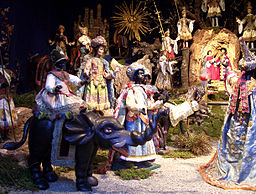Most Americans believe the historical accuracy of the Christmas story
A new Pew Research Center survey suggests that about three-quarters of Americans believe the biblical Christmas story to be historically accurate.
The survey, conducted on December 3 to 7 and published on December 15, polled 1,507 US adults.
Of those surveyed, 73 per cent say they believe that Jesus was born to a virgin, while only one in five do not believe in the virgin birth.
The poll also found out that 81 per cent of Americans believe that the newborn Jesus was laid in a manger, and that 74 per cent think that an angel really did appear to shepherds to announce the birth of Christ.
Three-quarters of those polled believed that wise men, guided by a star, brought the baby Jesus gifts.
The study found that just under two-thirds (65 per cent) of the respondents believe in all the elements of the Christmas story—the virgin birth, an angel's announcement of the birth of Jesus, wise men following a star bearing gifts, and the baby Jesus' being laid in a manger. The figure stands in sharp contrast to the 14 per cent who say they do not believe in the historical accuracy of any of the four events.
Among members of different Christian denominations, 89 per cent of evangelical Protestants, 76 per cent of Catholics, and 74 per cent of mainline Protestants believe in all aspects of the Christmas story.
The survey also noted that women were more likely to express belief in the Christmas story, and that belief in the biblical account is more common among respondents who have not completed college than it is among college graduates.
Aside from finding a "widespread belief in the biblical Christmas story," the 2014 survey also found that 44 per cent of US adults think "Christian symbols such as nativity scenes should be allowed on government property during the holidays whether or not they are accompanied by symbols from other faiths."












